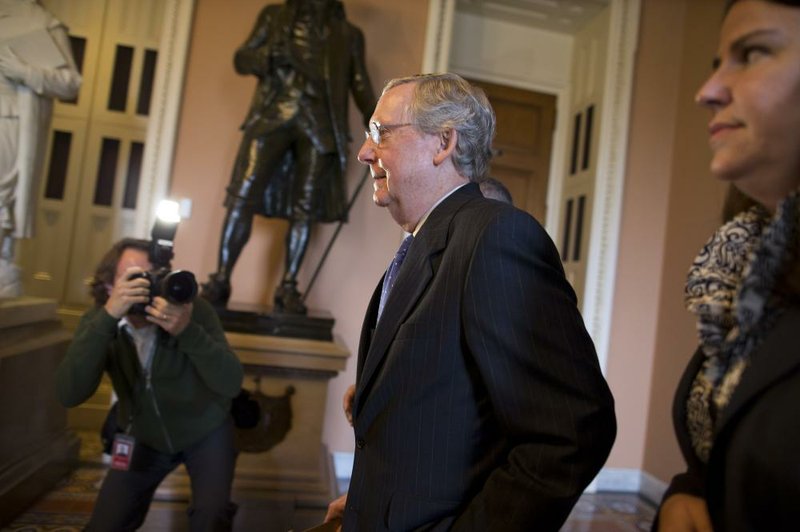FRANKFORT, Ky. - In the midst of a double-barreled re-election fight, Mitch McConnell is earning praise back home from some unlikely corners for brokering the deal that ended the partial government shutdown and averted a potential default on U.S. debt.
“He did yeoman’s work making sure this thing got fixed,” said Owensboro tobacco farmer Rod Kuegal, a Democrat.
Newspaper opinion pages that typically disagree with McConnell also give him positive marks. Among them: the Lexington Herald-Leader, which said McConnell “does deserve credit for what he does best - managing in the real, messy world of democratic government.”
While McConnell may have temporarily hushed Democratic critics who call him “the guardian of gridlock,” his collaboration with Senate Majority Leader Harry Reid,D-Nev., to break the impasse again riled Tea Party Republicans and other conservatives who long have criticized him.
“We’re feeling betrayed,” said Tim Isaac, a Tea Party Republican in Wilmore who owns a small information technology company. “Either he’s one of us or he’s not, and based on what he did,” he’s not.
By deciding to work with Democrats, McConnell became the latest Republican to show a willingness to risk the ire of Tea Party Republicans by making the pragmatic decision rather than the ideologically pure one. Earlier this week, New Jersey Gov. Chris Christie stopped fighting legal gay marriage in his state, angering parts of the GOP’s conservative base but endearing him to others across the political spectrum.
Even Republican allies say McConnell faced a tough choice as the shutdown entered a third week.
He could stand firm with conservative demands to strip the health-care law of money - a move that could help overcome a challenge from Tea Party-backed Matt Bevin - while angering everyone else he’d need to win another term. Or he could look to next fall and broker a deal with Democrats. That would anger the Tea Party but endear him to the broader electorate of independents and moderates whose backing he will need in the general election against likely Democratic nominee Alison Lundergan Grimes.
In the end, McConnell’s decision suggested a confidence that he can overcome such gripes from the Tea Party, which has never fully warmed to him. It also reflected his campaign’s belief that he’ll ultimately win the primary over Bevin and will face a tougher fight from Grimes in the general election next fall.
One year out, the electoral environment is shaping up to be difficult for Republicans.
Voters of all stripes are fed up with gridlock in Washington. And national polls show that Americans overwhelmingly blame the GOP for the standoff.
That could be a problem for McConnell, the top Senate Republican who is seeking his sixth term and is unpopular in his state.
But McConnell’s shutdown maneuvering may have undercut that argument, even though Democrats have spent nearly $1 million on TV ads this year painting him as “Sen. Gridlock.”
Grimes claims that McConnell had hidden in the shadows through much of the debt-ceiling debate until it was nearly too late. She argued that the senator opted to negotiate only because of political pressure back home, and that he now “is attempting to pat himself on the back for finally deciding to do his job.”
Tea Party activists say McConnell will be punished for compromising instead of siding with more-conservative lawmakers. They were demanding that any deal to end the shutdown include provisions gutting funding for President Barack Obama’s health-care law.
Bevin, a Louisville businessman and McConnell’s underfunded primary opponent, said McConnell “negotiated the GOP surrender” despite his promise that he “would fight to eliminate Obamacare ‘root and branch.’”
And, within days of the deal being struck, the Senate Conservatives Fund, a conservative group critical of the budget deal and that had been hammering McConnell in TV ads, promised to work on Bevin’s behalf.
That criticism aside, voters from various quarters say they give him credit for being the go-to guy for hammering out bipartisan agreements.
Robert Myer, a Democrat who is the co-owner of a Mayfield lumber company, applauded McConnell for helping end the shutdown and said he had few options because of Obama’s unwillingness to negotiate.
“I’m more appalled at Obama for doing nothing,” he said.
Other Democrats gave McConnell credit for deftly handling the situation.
“Somebody had to give in. … At least old Mitch was wily enough to get something for Kentucky out of it, even if he had to cave,” said retired teacher June Rice.
Front Section, Pages 4 on 10/24/2013
